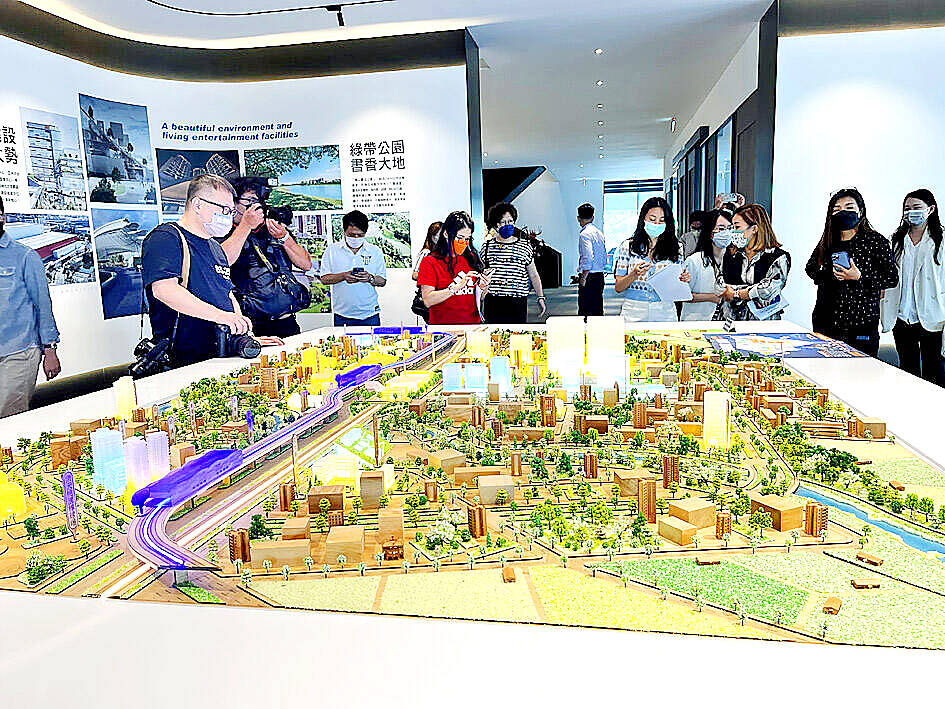Interest rates for new mortgages in January climbed to a seven-year high of 1.953 percent at the nation’s five major state-run banks, while new house loans fell to a four-year low, as rising borrowing costs cooled the property market, the central bank said.
The monetary policymaker announced its observations after compiling mortgage loan data from the Bank of Taiwan (臺灣銀行), Land Bank of Taiwan (土地銀行), Taiwan Cooperative Bank (合作金庫銀行), Hua Nan Commercial Bank (華南銀行) and First Commercial Bank (第一銀行).
As private lenders usually take cues from the state-run banks when setting interest rates and risk premiums, their interest rates for mortgages could have already exceeded the 2 percent mark and might climb higher if the central bank raises interest rates again this month.

Photo: Hsu Yi-ping, Taipei Times
The five state-run lenders, which account for 40 percent of housing loans in Taiwan, charged higher borrowing costs following the central bank’s 0.125 percentage point rate hike in December last year, it said.
New house loans totaled NT$36.95 billion (US$1.21 billion) in January, the lowest since March 2019 and a 42.7 percent slump from December, the central bank said, attributing the drop to a weakening market and fewer working days.
The number of working days dropped to 16, compared with 22 days in December and 21 days a year earlier, due to the timing of the Lunar New Year holiday, it said.
The central bank declined to speculate on the trend last month, citing poor sentiment and continued holiday disruptions due to the 228 Memorial Day long weekend.
It is better to combine the data from January and last month to eliminate the holiday effect and gain a better understanding of market movements, it said.
Major property brokers have reported a decline in transactions last month, although buying interest rose slightly after the Lunar New Year holiday.
Housing transactions in the nation’s six special municipalities sank 47.5 percent year-on-year in January and plunged 38.4 percent from a month earlier.
The influence of interest rate hikes likely persisted last month, as some banks make adjustments on a quarterly basis, the central bank said.
State-run lenders are conservative about mortgage operations this year on concern that an upcoming ban on transfers of presale housing purchase agreements would restrain potential buyers and sellers.
Interest rates for new consumer loans in January gained 30.1 basis points to a 10-year high of 3.063 percent, after the seasonal effect of student loans faded, the central bank said.
Student loans have low borrowing costs and weigh on the interest rates of consumer loans in November and December, the central bank said.

In Italy’s storied gold-making hubs, jewelers are reworking their designs to trim gold content as they race to blunt the effect of record prices and appeal to shoppers watching their budgets. Gold prices hit a record high on Thursday, surging near US$5,600 an ounce, more than double a year ago as geopolitical concerns and jitters over trade pushed investors toward the safe-haven asset. The rally is putting undue pressure on small artisans as they face mounting demands from customers, including international brands, to produce cheaper items, from signature pieces to wedding rings, according to interviews with four independent jewelers in Italy’s main

Japanese Prime Minister Sanae Takaichi has talked up the benefits of a weaker yen in a campaign speech, adopting a tone at odds with her finance ministry, which has refused to rule out any options to counter excessive foreign exchange volatility. Takaichi later softened her stance, saying she did not have a preference for the yen’s direction. “People say the weak yen is bad right now, but for export industries, it’s a major opportunity,” Takaichi said on Saturday at a rally for Liberal Democratic Party candidate Daishiro Yamagiwa in Kanagawa Prefecture ahead of a snap election on Sunday. “Whether it’s selling food or

CONCERNS: Tech companies investing in AI businesses that purchase their products have raised questions among investors that they are artificially propping up demand Nvidia Corp chief executive officer Jensen Huang (黃仁勳) on Saturday said that the company would be participating in OpenAI’s latest funding round, describing it as potentially “the largest investment we’ve ever made.” “We will invest a great deal of money,” Huang told reporters while visiting Taipei. “I believe in OpenAI. The work that they do is incredible. They’re one of the most consequential companies of our time.” Huang did not say exactly how much Nvidia might contribute, but described the investment as “huge.” “Let Sam announce how much he’s going to raise — it’s for him to decide,” Huang said, referring to OpenAI

The global server market is expected to grow 12.8 percent annually this year, with artificial intelligence (AI) servers projected to account for 16.5 percent, driven by continued investment in AI infrastructure by major cloud service providers (CSPs), market researcher TrendForce Corp (集邦科技) said yesterday. Global AI server shipments this year are expected to increase 28 percent year-on-year to more than 2.7 million units, driven by sustained demand from CSPs and government sovereign cloud projects, TrendForce analyst Frank Kung (龔明德) told the Taipei Times. Demand for GPU-based AI servers, including Nvidia Corp’s GB and Vera Rubin rack systems, is expected to remain high,